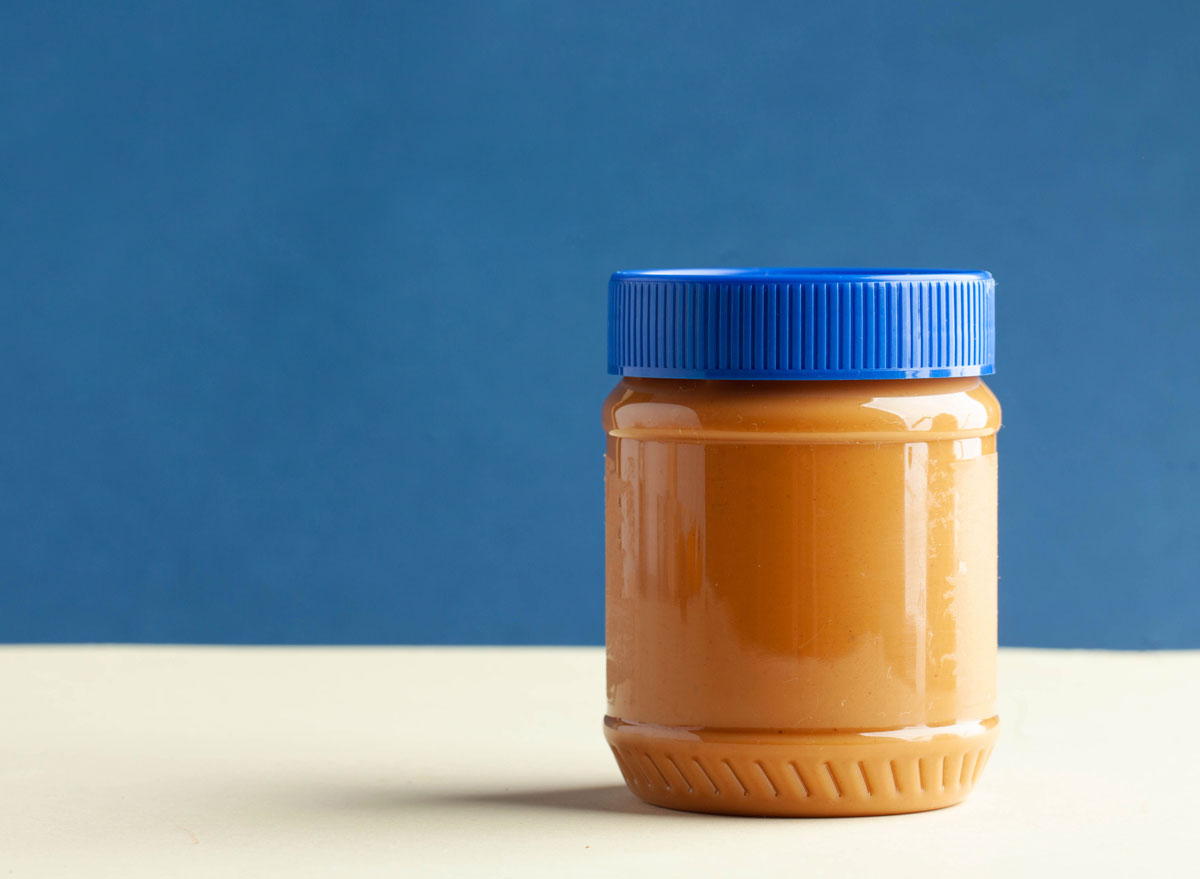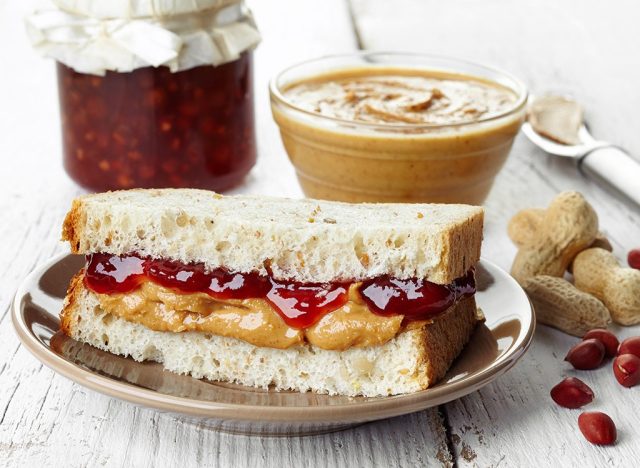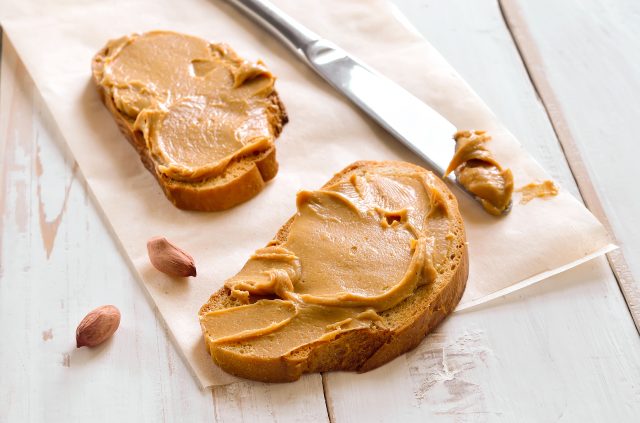Does Peanut Butter Go Bad? How to Spot a Spoiled Jar

A popular food and nutritious food beloved by people of all ages, peanut butter is as versatile as it is delicious. The spread pairs well with apples or celery sticks as part of a well-balanced snack, or you can, of course, eat it in a classic PB&J sandwich. It’s even great for baking, like in our easy recipe for three-ingredient peanut butter cookies. Many consider peanut butter to be a staple grocery item to keep on hand in the pantry or fridge because of its reputation as a shelf-stable spread. But all good things must come to an end at some point, and even the most shelf-stable of items are technically considered perishable to a degree—but to what extent does this apply to peanut butter, specifically? Does peanut butter go bad?
To help us find out whether or not peanut butter can go bad, we turned to the experts: Dr. Bryan Quoc Le, Ph.D., food scientist and author of 150 Food Science Questions Answered; Melissa Wasserman Baker, RDN, founder of FoodQueries; and Mary Wirtz, MS, RDN, a registered dietitian and consultant for MomLovesBest. Keep reading to get to the bottom of this peanut butter perishability mystery—and to better understand just how these ground legumes can affect your body, don’t miss Is Peanut Butter Good For You? 20 Effects of Eating It.
Does peanut butter go bad?

The short answer is, yes—despite its long shelf-life, peanut butter can go bad. However, Wirtz notes that the timeline for spoilage is fairly long.
“It usually takes a long time due to its low moisture content and high oil content,” says Wirtz. “The primary cause of spoilage is oxidation. When the oils in peanut butter are exposed to oxygen, they can become rancid, leading to off flavors and smells. Additionally, if water or other contaminants get into the jar, it could potentially lead to mold growth. However, this is less common due to the high oil and low water content of peanut butter.”
The shelf-life of your specific jar will vary based on the type of peanuts used and how they were processed.
“The variety of peanuts used in the peanut butter affects the shelf-life,” says Dr. Quoc Le. “Peanuts with more oils or with a higher concentration of unsaturated oils are more prone to oxidation. The presence of certain amino acids in the proteins of the peanut butter can also influence the taste, flavor, and texture of the peanuts during the roasting process, which gives different flavor profiles to the peanut butter through a chemical process known as the Maillard reaction. These flavors change during the storage of the peanut butter, some of which are more prone to off-flavor production and rancidity in the presence of air and moisture compared to others.”
How long does peanut butter last?
While it is shelf-stable, peanut butter is still a perishable food item. As such, its ability to go bad over time is inevitable, especially if it is not stored properly. The shelf life of peanut butter can vary depending on various factors, such as storage conditions and the roasting date.
According to the National Peanut Board:
- An unopened jar of peanut butter can last 6-9 months in your pantry and does not require refrigeration.
- An open jar of peanut butter, stored in the pantry can last about 2-3 months
- An open jar of peanut butter, stored in the refrigerator can last 6-9 months
“The best temperature to store peanut butter is in a cool, dry place, typically around room temperature (68-72°F or 20-22°C),” advises Baker. “However, once opened, storing it in the refrigerator (around 34-38°F or 1-3°C) can help extend its shelf life.”
How to keep your jar fresher for longer

Baker advises on what you can do to preserve the freshness of your peanut butter for as long as possible, summing this up in three easy tips:
- Always store your peanut butter in the refrigerator: “While it’s not necessary for unopened jars, once opened, storing peanut butter in the fridge can help extend its shelf life and slow down the oxidation process,” she says.
- Always make sure the jar is tightly sealed: “Make sure the lid is tightly sealed when not in use to minimize exposure to oxygen,” suggests Baker.
- Avoid contamination by using dirty flatware or serving utensils: “Always use a clean knife or spoon to [grab a] scoop to avoid introducing any contaminants,” she adds.
If you’re an occasional peanut butter eater who still likes to have it in the house, when in doubt of how fast you may consume it, opt for powdered peanut butter, which lasts for a year, according to Wirtz.
Clues your peanut butter has gone bad
There are a few telltale signs that a jar of peanut butter has taken a turn for the worse. But the good news is that most of these can be deciphered with a little help from your five senses.
“Oxygen from the air can react with the fats in peanut butter to form aldehydes, which give metallic off-flavors and off-odors,” explains Dr. Quoc Le. “Moisture from the air, the peanut butter itself, or from transferring other spreads like jam into the peanut butter can speed up the hydrolysis of fats, which generate fatty acids. These compounds also exhibit negative flavor and mouthfeel.”
“Higher temperatures and the presence of microorganisms that contaminate the surface of the peanut butter will accelerate these processes,” adds Dr. Quoc Le. “Incomplete roasting during the heat treatment process can allow native enzymes in the peanuts, known as lipoxygenase, to remain active and accelerate the fat oxidation process.”
“Signs that peanut butter has gone bad include a change in smell, taste, or color,” adds Baker. “It may develop a rancid or sour smell, or the taste may be off. If you see any signs of mold or if the texture has become extremely hard or dry, it’s best to discard the peanut butter.”
“Always trust your senses when it comes to food safety,” she concludes.
- Source: https://pubs.acs.org/doi/pdf/10.1021/jf60222a049
- Source: https://onlinelibrary.wiley.com/doi/abs/10.1111/j.1745-4557.1997.tb00459.x
- Source: https://link.springer.com/article/10.1007/s13197-015-2006-x
- Source: https://www.nationalpeanutboard.org/wellness/how-long-will-that-peanut-butter-last.htm









